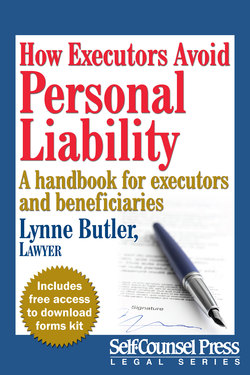Читать книгу How Executors Avoid Personal Liability - Lynne Butler - Страница 6
На сайте Литреса книга снята с продажи.
2. An Executor Is a Type of Trustee
ОглавлениеWords used in a will have definitions that are well-entrenched in law, because wills have been around for many hundreds of years. Our Canadian laws are based on British laws and processes that go back to the years before Canada existed in its current form.
These definitions bring with them legal rights and responsibilities that may be invisible to you when you read the will, but that exist in any event. For example, if you asked an average person to define the word “executor,” you would probably hear something like “the person who looks after the will and pays everyone their inheritance.” That is true as far as it goes. However, there is much more to it, as the word “executor” has been used in legal cases for hundreds of years. The law says that an executor of an estate is considered to be a trustee and must behave as a proper trustee.
Because an executor is a trustee, a mistake made by an executor is usually referred to as a breach of executor’s duty.
Every province and territory has a Trustee Act which governs the rights and responsibilities of an executor or estate administrator. You might not know it from simply reading the will, but those obligations apply to you. It would be a good idea for you to read the Trustee Act for your province. Guidance that is typically found in a provincial Trustee Act includes:
• How an executor may or may not invest estate funds.
• Whether an executor may delegate his or her investment decisions to an advisor.
• How and when a substitute executor may be appointed, if that becomes necessary.
• How an executor can request to be removed as executor.
• Rules for selling the estate’s real property.
• Information about the liability of executors.
• How an executor may use trust funds to look after a minor beneficiary.
• How an executor is to deal with creditors of the estate.
This is not an exhaustive list by any means, but these examples should be sufficient to indicate just how important the Trustee Act is to an executor. It contains valuable instructions and definitions which affect the executor. By agreeing to be an executor, you are agreeing to work within all of the rules and guidelines set out in this Act, even if you do not see those rules set out in the will.
Links to provincial Trustee Acts can be found in this book’s download kit.
Each province and territory has its own laws, rules, processes, and forms that apply to wills, trusts, and probate matters. The will you are administering must be interpreted within those guidelines. Always ensure that any reference material you use is relevant to your particular province and is up to date.
